#global law academy
Text
https://clat-coaching-centre-delhi.blogspot.com/2023/06/best-clat-coaching-in-delhi-for-law.html
#best clat coaching institute in delhi#clat coaching in delhi#best clat coahing in delhi#online clat coaching#coaching for clat preparation#clat coaching centre in delhi#best clat coaching centre in delhi#law entrance exam preparation#global law academy#law entrance preparation#clat 2024#clat 2024 preparation
0 notes
Text
whenever something good happens in this godforsaken country, or any other country in latam, there is always some dipshit saying something about how shamefull it is that the US is losing at progressiveness. I swear to god, people in the global north are so fucking condescendent. You people have not let go of the enlightenment's ideas of progress, as if everyone else is a buch of backwater people taht cannot possibly have complex thoughts about their lives and society.
Argentina has some of the best trans policies in the world, transfeminicide is typified in its law. Transfeminicide is also now typified in Mexico city's law, after the hard efforts of trans women who fought to get this done. The US and many countries in Europe don't even have feminicide typified, which Mexico and many otehr coutnries in Latam ahve had for years. People here organize and figth for their rights despite having to go against the goverment, the police, organized crime and the influence of the global north that actively works to stop progress in the global south for its own interests, often getting killed for it. Did you know Mexico is considered the most dangerous place to be a journalist? And yet people don't stop.
I have sat at meetings with different feminist organizations across Latin America and they are have very profound things to say about these topics in the context of living in wars, under imperialism, with a fragmented identity due to colonization, etc. There is very rich literature on all kinds of social problems that you guys don't know about because it's written in a language you don't speak and your academies have long looked down on. We don't have to learn from you or follow your example, we don't need you.
#us sociology looks down on latin american sociology because the us tends to have a more positivist approach to it#latam's has a way more constructivism approach with very robust literature that often gets ignored even when anglos shift their approach
6K notes
·
View notes
Note
hi wawa! hope this isn't a weird question, but do you know if trans people are generally accepted by their communities in mainland china nowadays? i myself am not chinese, but i do hope that my trans chinese brothers and sisters are living safe and happy lives in their country/communities.
Transgenderism is not as widely understood atm from my understanding but in recent years it has gotten more exposure, especially transwomen. Obviously people in the LGBT+ community are more knowledgeable about trans identity.
As to safety and happiness, like in most places globally, it depends on a trans person's socio/economic status and network of support;
Jin Xing, a famous TV personality/host and dancer, for example, is extremely popular and well-liked (even among older generations), and is openly trans. However she has had celebrity status for most of her life, being that she was a soldier and then dancer in the People's Liberation Army Dance Academy. There are multiple trans(woman) internet celebrities that I've seen who have a lot of fans as well, who can drown out detractors.
But if you're poor and/or don't have a support network, it's undoubtedly a tough existence. There is a relatively well-known documentary that came out a few years ago, The Two Lives of Li Ermao, that documents the struggles of a transwoman. It is rather grim but it sort of gives you a peak into one person's life dealing with social pressure and financial struggle.
Aside from that, I think, it is getting better in some ways in terms of visibility/exposure (leading to awareness and the possibility of social support), but there are other policies in medicine and broadcasting that are also making things more difficult. And it's not exactly rainbows and flowers for trans people anywhere, either, so idk what you expect there. Legally, there are no laws specifically discriminating against trans people but there are also few anti-discrimination laws, so unless China passes major LGBT law reforms, it's a social issue that gets neglected and left to wither in a gray area, often under the pretense of dealing with more important matters.
Some other articles if you're interested:
Public Opinion of Transgender Rights In China (the survey sample is pretty low but it's still worth a look)
China’s ‘Anti-Sissy’ Campaign Unleashes a Wave of Online Transphobia
Less political, more personal: The many struggles of China’s transgender population
Straightly Chinese: The Emergence of Systemic Homophobia in China (< I have linked this on my blog before and it is not specific to transgenderism but I think it provides a good insight into how the status quo of heterosexism and by extension, cissexism, is maintained in China, as well as perhaps, other Asian countries)
195 notes
·
View notes
Text
Hello ! I know I'm not really active , but I'm doing my best to come up with new ideas . Anyways, I'm really happy people enjoy this weird AU .I'll maybe post some drawings about this au later , but please don't expect something good , I suck at drawing
Anyways , I was thinking about writing about Parfedia. Do here are some points of my au about it .
Parfedia
So I remember that Licorice Cookie used to be bullied when he was a magic student at that academy , so I'm gonna start with that .
Licorice Cookie was a smart student , but his magic skills weren't the best .
So he was always bullied by most of the students
But that didn't stop him to continu his studies . He decided that he would take revenge , and show these bullies who's the real boss.
So he somehow managed to become one of the rulers of Parfedia. ( I don't know how too )
So then he formed a sort of group that rules over Parfedia based on three pillons : Magic , Knowledge and Strengh
So he represents magic of course . He thinks that Magic is the most important of the three pillons.
The pillar of Knowledge is represented by Éclair Cookie
Eclair Cookie studies relics and stars, his goal is to understand the ultimate knowledge
It is said that there is deep in space the library that holds all the knowledge of the univers across the time
So Éclair Cookie is endlessly looking for this library using his astral telescop and the knowledge that can provide relics .
Eclair Cookie beleives that all questions can be answered by reveiling all the secrets of the past
He gives importance to the slightest details like if you give him a pebble and says it's a stone from an old destroyed castle , he will take more than a month to study it and then correct you if you gave him any misinformation
But now , who will take care of the pillon of Strengh
Long story short , when Licorice Cookie talked to Éclair Cookie about making an alliance , they both agreed, and then Éclair Cookie tried to convince Tea Knight Cookie to join them .
Tea Knight Cookie is an old man so it took him time to accept the offer.
So he accepted it with one condition, that he would take care of armies and global security in Parfedia.
So now , the police and all security domains obey to Tea Knight Cookie's orders
Tea Knight Cookie is an old man who now has multiple responsabilities and has multiple war trauma ,so he sometimes needs some time alone
And suprisingly, the other two let him some time alone to relax . It mostly like a day or two per month
They don't want him to get sick from overwork
Every Wednesday , three of them reunite in some kind of tea party to discuss of many things , if it's about their progress in their domain or just about their lives . ( I think it's a little wholesome)
Suprisingly, Parfedia became a very safe place
The incidents may be rare, but they are extreem.
Almond Cookie is still like some kind of investigator about magic incidents , but he's also the leader of the police in Parfedia
( we should let this guy have more time to himself to atleast have a meak without a worry )
But he still has to deal with the extreem emergencies
These emergencies are caused by a group of wisards that opposed themselves to the new gouvernement.
So why not just teleport them to jail ? Licorice Cookie actually did it multiple times , but they keep multiplying
Guess the law now should help now , magic doesn't solve anything by its own
Latté Cookie , Espresso Cookie and Prune Juice Cookie are teachers at the Parfedia Magic Academy.
Prune Juice Cookie also seem to have a higher grade then the other two
The three of them tho work for Licorice Cookie. They are reasearchers in magic
Their goal ( and also Licorice Cookie's goal ) is to find the secrets about the origine of Cookie Magic , wich can lead to infinite power
These three tho never get along , they're always arguing on wich one of them is tight or has found the results of a research.
But otherwise , they can work together
Now , the Red Velvet Dragon ... and Red Velvet Cookie ... am I the only one who thinks they should be related ?
So , Red Velvet Cookie and Licorice Cookie were childhood friends, but had separate ways with time
Unfortunatly , Red Velvet Cookie got a rare incurable ilness that causes his body to slowly crumble .
That ilness took both of his arms
In a last hope , he travelled to Parfedia to maybe find some spell to stop the propagation of the ilness to the rest of his body
So here he is meeting Licorice Cookie again
Licorice Cookie then tried to cast a spell on Red Velvet Cookie to try to save him
He turned out that he turned him into a dragon
At least Red Velvet Cookie got his arms back :D
Well yes , Red Velvet Cookie can alternate between a cookie form and a dragon form
But the situation wasn't that bad , it gave him more of a second chance
So Red Velvet Cookie decided to stay mostly in his dragon form and travel around undiscovered places on Earthbread to live in
He also lives with multiple cake hounds ! I can't remove this detail from him ! They're his travelling companion, and he's their leader and protector
( he may or may not eat other cookies when he's really hungry )
Rex Velvet Cookie comes back from time to time to visit Licorice Cookie and Parfedia
The Licorice moster is orginiated.from a failed experiment made by Licorice Cookie and his reasearchers
Basically it got out of control , took life and started growing rapidly .
So after a really really long fight , they managed to be pushed away to the Licorice Sea where it was seeled
And about that weird theird boss in the Guild Battles ( the one that looks like Pure Vanilla Cookie)
So well the group of wisards that are against the three pillons tried to find a way to get Magic similar to the one that provides the Soul Jams
So they created a magic magnet that catches the dust of Soul Jams and stars
It is a really really weak quantity that they could extracted .
But they managed to creat whatever that thing is ( that boss scares me , I admit it ) and let's it's free to attack Parfedia
The little Poison Mushroom Cookie fella is also a student of the Parfedia Magic Academy
He's just slightly taller than the original Poison Mushroom Cookie
( And maybe has 2 more iq )
He's just alittle less weirder
Nobody is allowed to bully the boy , he's personaly under Licorice Cookie's protection
People don't understand why tho .
Poison Mushroom Cookie is very friendly , he gets along Cream Puff Cookie and they are very good friends
Cream Puff Cookie is an excellent student , like she's one of the top ones in the school , and she's more organised
She's also very popular and gets excellent grades
And she also gets easily stressed to try to keep up
Poison Mushroom Cookie has just average grades and just like to roam around the school
But they have lunch together
They has a very nice friendship ,
And Poison Mushroom Cookie's weirdness is a kind of stress releiver for Cream Puff Cookie
( I want to make something a little wholesome on this one )
So this is end for the Parfedia part , it took me alot of time to write.I feel like everything I write turns more and more into nonesens . But I hope you enjoyed it nonetheless . Cya !
#cookie run au#cookie#crk#cookie run kingdom#crk au#Licorice Cookie#Eclair Cookie#Tea Knight Cookie#cookie run Parfedia#Parfedia#cookie run#Red Velvet Cookie#Latte Cookie#Espresso Cookie#Prune Juice Cookie#poison mushroom cookie#Cream Puff Cookie#Almond Cookie
13 notes
·
View notes
Text
Weeks after being flagged for her pro-Hamas agit-prop pushed on toddlers at PS 59 on Manhattan’s Upper East Side, Siriana Abboud remains on the payroll and unpunished — because it’s next to impossible to discipline, much less fire, misbehaving New York City teachers.
And also because she has friends in high places.
Last month, The Post’s Susan Edelman broke the news of Abboud pushing an anti-Israel agenda on pre-K tots and sharing tips on indoctrinating kids online: Her site’s Allusio Academy preschool program seems to have come directly from a Hamas pre-K curriculum guide.
Her Instagram page is chock-a-block with pro-Palestinian content: skewed teach-ins on the history of Palestine, Zionism, European colonialism, and “orientalism,” plus how to help your child advocate for Palestine.
Days after Hamas’ Oct. 7 atrocities, she wrote on Instagram, “we stand with those still tearing down border walls” and “we show solidarity with those still fighting to free their stolen land.”Last month, The Post’s Susan Edelman broke the news of Siriana Abboud pushing an anti-Israel agenda on pre-K tots and sharing tips on indoctrinating kids online.Instagram @sirianajanine
Parents have asked the city Department of Education to investigate this teacher’s hate, but so far all that’s happened is that she’s gone on indefinite “medical leave” — an obvious sign that the DOE is simply hoping to wait out the storm.
State law makes it nearly impossible to fire a bad or even dangerous teacher who has tenure: The union-inspired arbitration rules can drag out the process for years.
In one infamous case, a city teacher accused of misconduct toward his students earned over $1.7 million in salary in the course of a 20-year “rubber room” stint.
But that’s not all that’s going on here.
Abboud’s issues go back at least a year: Jewish parents and teachers at the school complained back in October 2022 when she put a crude antisemitic poster on the bulletin board outside her classroom.
Other than having her take it down, the only official response was a single “restorative justice” session, where her colleagues could express their feelings.
Within weeks of that, the city Department of Education honored Abboud with a 2023-24 Big Apple Award, applauding her work “as a liberation-inspired educator” who “centers children’s agency and global consciousness,” raises the “societal expectations” of young children and other woke claptrap.348
In other words, she won official acclaim for the radicalism that now has her out of the classroom, but still getting paid.
Schools Chancellor David Banks plainly hasn’t cleaned house at DOE headquarters, if he’s even tried.
No wonder alert middle- and working-class families are fleeing the DOE’s schools.
14 notes
·
View notes
Text
we see a lot of mistrali citizens listening to ruby’s broadcast in 8.5: jaune’s sister and in-laws + the crowds in the transit station. it has been months since haven academy closed, but—even more so than vale, which gets the subtle glimpse of the dust shop open for business as usual—it’s made clear that mistral is weathering the storm. in fact, for ordinary civilians, it really seems like not much has significantly changed at all.
with that context, i think it becomes profoundly interesting that 1. ruby doesn’t mention mistral in her broadcast at all—admittedly, in part because there’s no one ozpin trusted left in the kingdom—and 2. the kids direct the evacuation to vacuo, an impoverished state they know to be salem’s next target, instead of mistral, the much larger and more prosperous kingdom that they left behind in perfectly good working order after salem’s forces departed. now in one sense, this was a short-term tactical decision in that the kids have an urgent need to get to vacuo before salem does and, with less than an hour to plan a city-wide evacuation, some longer term strategic thinking obviously fell by the wayside. because, yanno, crisis mode.
but! there’s also a beat in before the dawn where jax thinks “with the global cct disabled, vale in ruin, haven leaderless, and atlas closed off, vacuo was theirs for the taking.” and conversely at another point theodore refers to haven as “mistral academy.” so there is a consistent pattern here—across the full spectrum from villain to corrupt old guard to hero—of equating haven academy to the kingdom of mistral and vice versa. ruby gives a shoutout to glynda (who as far as she knows is still actively fighting to reclaim beacon) but says nothing about surviving haven faculty—or about her other allies, like the belladonnas, who presumably got looped in and earned some serious goodwill from the mistrali public by showing up to prevent another beacon from happening at haven.
the conflation of the academies/the huntsmen with the whole world or humanity itself is nothing new—the entire “salem wants to destroy the world/salem wants to destroy the academies” blurriness can only exist because the civilian world is so invisible from within the huntsmen institution—but this feels like it might be the most important occurrence, because there were explicitly thousands of people in mistral watching this broadcast and hearing this huntress mention BEACON but not haven or mistral.
and most of those people would have heard cinder’s broadcast during the vytal festival tournament. the broadcast where she identified herself as mistrali and specifically gestured toward the “undesirable” situation with the huntsmen institution there. what does ruby’s broadcast tell these people?
- the powerful, malevolent entity responsible for the horrific fall of beacon intends to “destroy the huntsman academies”
- this entity already attacked haven, forced the academy to close, and then left. they weathered the storm. they’re safe.
- this person—or someone connected to her, at least—claimed to act out of resistance to, as she saw it, the corrupt and tyrannical huntsmen institution, especially in mistral, and the huntress on the broadcast effectively confirmed that claim
- the huntress in the broadcast also doesn’t acknowledge that mistral even exists
- ???
talk about planting seeds of doubt.
and ordinarily i’d stick this in the headcanon/fic fodder pile because the narrative is clearly headed to vacuo, but… a decent chunk of the major supporting cast is stranded in atlas now. with a falling communications satellite and what amounts to a flying pickup truck as their only resources, meaning that basically the only place they can reasonably escape to is argus.
oh. and anima already has a fairly sizable population of people who don’t like how the kingdom runs things enough to take their chances with the grimm and rampant banditry rather than live within the kingdom’s protection
#ruby tried to be honest without losing control over the narrative#and maybe she did—for vale and vacuo and mantle#but for mistral?#what do the people of mistral make of all this#without a huntress to guide them?
66 notes
·
View notes
Text

edits: Made his regular fit more casual and added his cover job outfits as well. Updated his backstory a bit and also included some past jobs of his.
Amanatsu "Aman" Dracan-Rodriguez (born Genji Hashimoto)
Theme: Disguise - Spy x Family Ost
Height: 5'10" (177 cm)
Weight: 210 lbs (95 kg)
Birthday: June 17th
Current Residence: Artazon, Paldea / Interpol Headquarters
Likes: His job, puzzles, things he can twirl around in his hands, pushing people's buttons to get a reaction, literature, art, making a difference, figuring out how to do something that people tell him he shouldn't do.
Dislikes: Not understanding why something/someone is the way they are, feeling helpless, losing his temper
Fears: Losing his family again

Born in Jubilife, Sinnoh as Genji Hashimoto to a local gang leader and his wife, who used to be a famous singer. Much of his first seven years, he would be groomed to be the Yakuza prince that his father wanted him to be while his mother would try to shelter him from cruelty of the world. Although Aman would be desensitized to a lot, he still gained a sense of morality from his mother.
When he was seven, the life he had with his parents would be cut short as a rival gang set an explosive in the car the family was in. It would cause Aman to lose his mother, father, and also his right limbs. Thankfully, an Interpol Agent was the first to arrive at the scene and the global agency would help Aman not only recover physically but also put him into a witness protection program where he would later be placed for adoption under a different name.
He would be accepted by willing and loving arms of two men: Hassel Dracan and Brassius Rodriguez. For once in his life, Aman experienced a true peaceful home with them and he'd accept both of their last names.
Hassel and Brassius proved to be great (albeit overbearing at times) fathers. Aman was introduced right away to his extended family on Brassius' side: Tia Leppa and Tio Trueno, a "cousin-in-law" that he would call Uncle Calhoun because of age difference, and two second-cousins that were around his age named Pecha and Rawst. Aman immediately grew attached to all of them and loved seeing them visit during summers.
By the time he was ten, Hassel and Brassius enrolled Aman into Naranja-Uva. His track was humanities. Aman was bright and aced all his classes, which lead him to a lot of down time. As a way to entertain himself, he’d focus his attention on peers instead and get into trouble trying to pry into the personal lives of his other students. He would also see how many rules he can break without the school finding out. When his cousins became enrolled in the academy as well, though, Aman was chosen by Pecha, who got elected as class president, to be a secretary and that helped keep him busy.
After school, Aman knew he wanted to be a detective and jumped into police work. He so quickly climbed the ladders that he was noticed by Interpol (who had still been keeping an eye on him most of his life) and offered a job within the organization which he accepted. The position he would get in Interpol would mainly be cover jobs to infiltrate and investigate evil teams. Often he is leading the clean up (since a kid somehow miraculously wrapped up the thing on their own)
Currently, Aman's cover is a Depot Agent by day and a Team Neo-Plasma Grunt by night investigating what the evil team has planned.
Some of Aman's jobs over the years:
Kalos - Was a research assistant to Sycamore and investigated Team Flare. Helped in clean up of the region.
Kanto & Johto- Was a kimono girl. Cleaned up some remaining Team Rocket members with the help of a Rocket grunt that needed an out. Helped that Rocket grunt get into the protection and relocation program that Interpol offers.
Hoenn - Posed as a Sailor. Cleaned up remnants of Team Aqua.
Galar - Clean up after ex-Chairman Rose's grand scheme. Cover job as League Staff. Determined who was still loyal to Rose and had them dealt with as precaution so no more incidents would plague the league.
Paldea - No cover job, but investigated Team Star by also pretending to be a grunt. Fastest investigation. Team was deemed not a threat and to leave it to the school to figure out what to do with them.

Ships
tbd ship name | Aman x Aster (Aster belongs to @astererer)
Kazman | Kaz x Aman (Kaz belongs to @astererer )
Herbal Tea Shipping | Aman x Reina (Reina belongs to @outoutdamnspark)
20 notes
·
View notes
Text

Remembering David McCallum- Scottish actor and musician.
David McCallum, who became a heartthrob in the hit series ‘The Man From U.N.C.L.E.,’ Dies at 90 💔 So sad a fine actor a great talent and a true gentleman.
An experienced character actor, he found fame in the 1960s as the enigmatic Illya Kuryakin. The British actor who played the mysterious secret agent Illya Kuryakin alongside Robert Vaughn’s Napoleon Solo in the 1960s hit spy drama The Man From U.N.C.L.E. was a secret international counterespionage and law-enforcement agency called U.N.C.L.E. (United Network Command for Law and Enforcement). The series premiered on September 22, 1964, and completed its run on January 15, 1968. The role turned the actor into a global sex symbol.
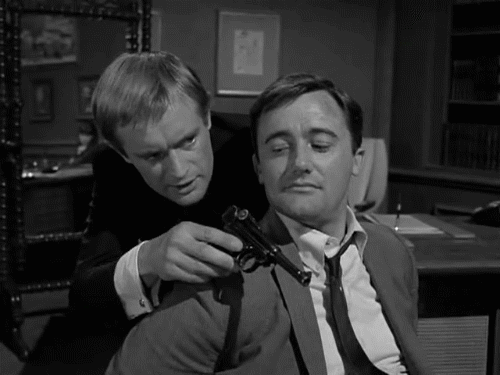
The success of the James Bond books and films had set off a chain reaction, with secret agents proliferating on both large and small screens. Indeed, Bond creator Ian Fleming contributed some ideas when the series was being developed, according to Jon Heitland’s book, The Man From U.N.C.L.E.: The Behind-the-Scenes Story of a Television Classic (special introduction by Robert Vaughn)

David McCallum took his place among one of the most iconic casts Hollywood ever assembled, nothing in the film’s title, The Great Escape, He was playing naval officer Eric Ashley-Pitt in the 1963 Second World War epic about the mass escape of British and Commonwealth POWs from German Stalag Luft III camp, through another POW turn in Colditz (1972-1974).

David McCallum with Steve McQueen on the set of the WWII epic. The Great Escape brought him to a US audiences. (Image: Moviestore/REX/Shutterstock)

In 1975, he had the title role in a short-lived science fiction series, “The Invisible Man,” and from 1979 to 1982 he played Steel in a British sci-if chiller “Sapphire and Steel” (1979-1982). Over the years, he also appeared in guest shots in many TV shows, including “Murder, She Wrote” and “Sex and the City, a romantic comedy-drama television series filmed in New York.

Later, in the 2000s as an eccentric medical examiner on “N.C.I.S.” he reached a new audience as Dr Donald "Ducky" Mallard, the medical examiner in US TV drama NCIS. McCallum was known for playing a pathologist on the hit CBS TV programme NCIS, which went on to generate several spinoff series, for twenty years. NCIS is the third-longest-running scripted, non-animated primetime television series in the U.S that is currently on air.
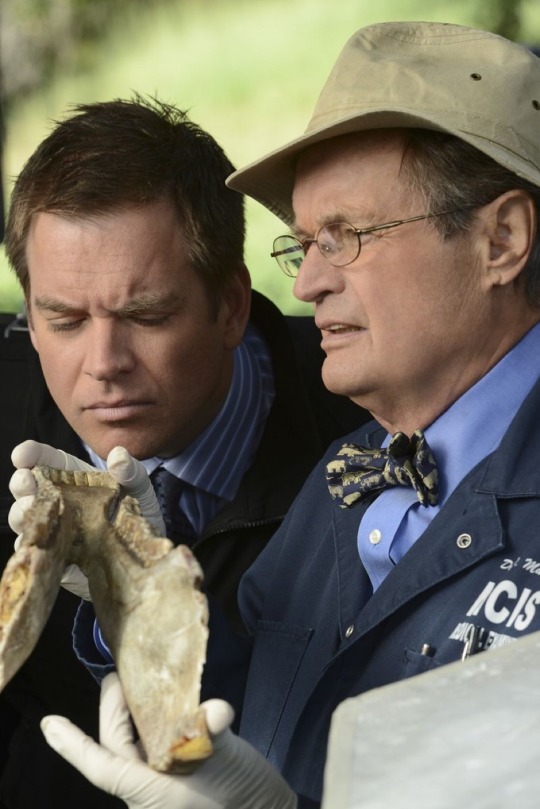
He was a true Renaissance man — he was fascinated by science and culture and would turn those passions into knowledge. For example, he was capable of conducting a symphony orchestra and (if needed) could perform an autopsy, based on his decades-long studies for his role on NCIS.

The Scottish-born actor died in New York on Monday 25th September 2023. He lived in Manhattan. David Keith McCallum was born on 19th September 1933 in the Maryhill (Scots: Maryhull - Scottish Gaelic: Cnoc Màiri) area of Glasgow, to a father who was the first violinist for the London Philharmonic and a mother who was a cellist.
David won a scholarship to the University College School in north London and took up the oboe with a view to a classical music career. Thus he originally pursued a career in music, training on the oboe and studying for a time at the Royal Academy of Music, though he soon left and enrolled at the Royal Academy of Dramatic Art. After RADA he started performing with repertory theatre companies.
David McCallum was drafted into the British military in 1951 and served two years, including 10 months in what was a small-arms expert. Not long after his discharge, he signed with the Rank Organization, a British production company, and began acting both in movies and on television.
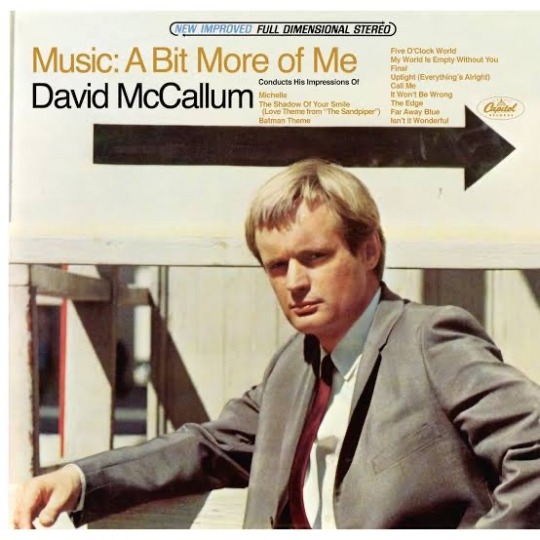
David McCallum a classically trained musician, created arrangements of popular songs of the day alongside a few original pieces and made four albums with forward-thinking producer and composer David Axelrod. Those groovy productions have been sampled a lot by trip-hop artists and more. In particular, “The Edge” from 1967’s
“The Edge” from 1967’s Music: For those who might have heard this song sampled elsewhere, you could have heard it in various places. From Masta Ace (“No Regrets”) to John Legend (“Actions”) his original was used in Edgar Wright’s Baby Driver, the 2017 film starring Ansel Elgort.
Check out the video below and listen for that familiar intro:
youtube
David McCallum - From The Man from U.N.C.L.E. to NCIS, and all performances in between, he was a multifaceted talent during 7 decades and 100 films and TV shows a True Legend.

R.I.P David 💔
1933-2023
#DavidMcCallum #Scottishactor #Britishactor #U.N.C.L.E. #IllyaKuryakin #TheGreatEscape #navalofficer #EricAshley #NCIS #secretagent #Edge #music #Ducky #DoctorMallard #actor #talent #gentleman #Legend #ripdavidmccallum
17 notes
·
View notes
Text
Thursday, May 16, 2024 Canadian TV Listings (Times Eastern)
WHAT IS NOT PREMIERING IN CANADA TONIGHT:
I CAN SEE YOUR VOICE (Premiering on May 19 on Global at 9:00pm)
NEW TO AMAZON PRIME CANADA/CBC GEM/CRAVE TV/DISNEY + STAR/NETFLIX CANADA:
AMAZON PRIME CANADA
ACADEMY OF COUNTRY MUSIC AWARDS (Season 3)
FORGETFULNESS
MADGAON EXPRESS
OUTER RANGE (Season 2)
CRAVE TV
BELLEFLEUR (Season 1, Episodes 1-2)
NETFLIX CANADA
8 MILE
BLACKKKLANSMAN
BRIDGERTON (Season 3 Part 1)
GIRLS TRIP
JAWS
LES MISÉRABLES
MAESTRO IN BLUE (Season 2) (GR)
ROBIN HOOD
IIHF MEN’S HOCKEY
(TSN) 10:00am: Finland vs. Austria
(TSN3) 10:00am: Kazakhstan vs. Sweden
(TSN) 2:00pm: Canada vs. Norway
(TSN3) 2:00pm: U.S. vs. France
MLB BASEBALL
(SN) 1:00pm: Yankees vs. Twins
(TSN2) 7:00pm: Rays vs. Red Sox
(SN Now) 8:00pm: A’s vs. Astros
NHL HOCKEY
(CBC/SN) 7:00pm: Game 6 - Rangers vs. Hurricanes
(CBC/SN/SN1) 10:00pm: Game 5 - Oilers vs. Canucks
PWHL HOCKEY (TSN) 7:00pm: Game 4 - Montreal vs. Boston
QMJHL HOCKEY (TSN4) 7:00pm: Game 5 - Drummondville Voltigeurs vs. Baie-Comeau Drakkar
LAW & ORDER TORONTO: CRIMINAL INTENT (City TV) 8:00pm (SEASON FINALE): The neighbors of a respected defense attorney become the prime suspects in her murder.
THE BRIDGE (Discovery Canada) 8:00pm: After being tempted with a taste of home, both teams are allowed to gain a new teammate.
THE GREAT POTTERY THROW DOWN (Makeful) 8:00pm: Endangered Animal Sculptures and a Tall Vase
NBA BASKETBALL (TSN4) 8:30pm: Game 6 - Nuggets vs. Timberwolves
DINNER WITH THE PARENTS (Showcase) 9:00pm (SERIES PREMIERE): Desperate to avoid embarrassment when his girlfriend breaks up with him on the night she's supposed to meet his family, David blunders into an ill-advised ruse.
LEGO MASTERS AUSTRALIA (Discovery Canada) 9:00pm: The teams must build their creations on a rotating baseplate that reveals a story in three different parts, encompassing a beginning, middle and end.
PORTRAIT ARTIST OF THE YEAR (Makeful) 9:00pm: Joe Sugg, Daryl McCormack, Lenny Rush
#cdntv#canadian tv#cancon#canadian tv listings#law & order toronto: criminal intent#the bridge#the great pottery throw down#lego masters australia#portrait artist of the year#iihf hockey#mlb baseball#nhl hockey#pwhl hockey#qmjhl hockey#nba basketball
2 notes
·
View notes
Text
Should our future food be genetically engineered? (Washington Post)
While genetically modified crops may still provoke fear and uncertainty, some scientists argue that not only can they help to alleviate human health concerns, but they might also be able to help fight climate change. And as new tools like CRISPR, which can make targeted cuts in DNA, gain traction, genetic food engineering could be on the cusp of a quantum leap.
“It’s all political,” Stuart Smyth, a professor of agricultural and resource economics at the University of Saskatchewan, said of the Philippines decision. “It’s not based on science.”
Genetically modified crops are ones that have had genetic material inserted from another species of organism. For example, the first genetically modified food product — a tomato introduced to the public in 1994 as the “Flavr Savr” — had two genes added. One conferred antibiotic resistance, and another gave the tomato a longer shelf life. (The company manufacturing the Flavr Savr, Calgene, had to cease production in 1997 because of rising costs.)
Today, there are only a few genetically modified crops in production, but those that exist are widely grown. In the United States, 94 percent of all soybeans, 96 percent of all cotton and 92 percent of all corn was genetically modified as of 2020, according to the Food and Drug Administration. These crops became popular because of their ability to withstand glyphosate, a key ingredient in the herbicide known as “Roundup.” Other countries that grow genetically modified crops widely include Canada, Brazil and India.
No major scientific research has found that genetically modified crops cause health problems in humans. In a 400-plus-page report published in 2016, the National Academies of Science found that “no substantiated evidence that foods from GE [genetically engineered] crops were less safe than foods from non-GE crops.” The report urged analysis of suchfoods by the traits that they include, rather than how they were created.
Yet engineeredcrops remain unpopular. According to a Pew Research Center poll from 2020, 38 percent of Americans believe genetically modified crops are unsafe, compared with 27 percent who believe they are safe. Thanks to a law passed by Congress in 2016, foods in the United States are required to be labeled as bioengineered if they involved genetic engineering beyond what could be accomplished with conventional breeding techniques. One analysis showed that consumers are willing to pay 20 percent more to avoid GM foods.
At the same time, a small but growing body of research has argued that GM foods could play a significant role in cutting carbon emissions. In a study published last year, researchers at the University of Bonn in Germany and the Berkeley, Calif.-based Breakthrough Institute found that widespread use of these crops in Europe could cut the agricultural sector’s emissions by 7.5 percent.
Another study found that the use of GM crops globally savesaround 23 million metric tons of carbon dioxide every year — equalto removing around half of all vehicles from roads in the United Kingdom.
There are two primary ways genetically engineered crops could cut carbon emissions.
First, theycan be more productive, creating higher yields for farmers and allowing them to grow more food on less land. One global analysis found that GM crops on average lead to a 22 percent increase in yields. At the same time, one-third of all emissions from agriculture are from deforestation and the destruction of other natural areas — as farmers expand and grow more crops, they cut down trees that are storing CO2 in their trunks and leaves.
Other scientists say crops with herbicide resistance can require less tilling. “Every time soil is tilled, it releases carbon back into the atmosphere,” Smyth said. Herbicide-resistant corn, for example, can endure being sprayed by weed-killing agents, preventing farmers from having to till the land to remove weeds.
Butthe environmental community is split. Some activistssay focusing on climate change obscures the real problem with genetically modified crops: the role of big corporations in controlling food production.
2 notes
·
View notes
Text
Philip Sidney wrote a Defence of Poesie in 1595. Percy Shelley wrote a Defence of Poetry in 1821. Why, we might ask, does literature have to defend itself?
In part, it's Plato's fault. His famous exiling of poets from a well-ordered republic, on the grounds that they offered doxa, or opinion, rather than logos, or reason/discourse, instantiated an unhappy split between what we now call art and what we now call science. For Plato, the classic Greek poets—Homer and the tragic dramatists—whose work had formed the basis of a Greek education (paideia) depicted in their work all manner of deleterious behavior: murder, incest, cruelty, cowardice, treachery, strong passions out of control. Poetry thus weakened moral character and potentially influenced both actor/performer and audience. Since poetry in this period meant oral poetry, whether epic or dramatic—not the reading and study of written texts—the possibility of such emotional effects, rather than a rational assessment and distance, was, he thought, strong. If a schoolchild memorized Homer on the wrath of Achilles, what he learned was wrath, not poetry.
From the perspective of a modern educational system, where poetry is far less central than it was to the ancient Greeks, Plato's insistence on the dangers of poetry and poets may seem either quaint or excessive. But that is because we have so diminished the importance of literature (and music and art) over the years.
Both in Republic, where he describes what he regards as an ideal education for guardians and citizens of Athens, and elsewhere in his dialogues, Plato emphasizes the role of poetry and music on the one hand, and physical training on the other, as the key elements for training the soul and the body. In his own academy, Plato taught a different kind of learning, one based upon dialectics and philosophical reasoning, with the claim that literature should serve a moral and social function and should teach cultural elements like goodness, grace, reason, and respect for law.
This instrumental view of literature (Plato's poetry includes epic, tragedy, and other modes of imaginative writing), which demands that it do some good in the world, is, I will argue, part of the difficulty that literary study has wrestled with from its beginnings to the present. What is often called "the ancient quarrel between philosophy and poetry," the idea (voiced from the side of philosophy since Plato) that literature needs to make us better people, is now partnered with and augmented by a more modern set of questions about why we should read and study literature in a world increasingly global, economic, technological, and visual. Are the blandishments of the rhapsodes and interpreters and sophists, the orators, still dangerous? Still seductive? Does literature threaten society, or does it help to build society's values and institutions? Or are these the wrong questions and the wrong justifications for literature and its readers?
Marjorie Garber, The Use and Abuse of Literature
5 notes
·
View notes
Text
By: Bernard Lane
Published: Aug 24, 2023
The World Professional Association for Transgender Health (WPATH) and American medical societies have sacrificed child safety and standards of scientific evidence in pursuit of fashionable causes and financial self-interest.
This is the charge levelled in a blistering court brief filed last week by Alabama’s Attorney-General Steve Marshall and 15 other Republican states in defence of Missouri’s law restricting medicalised gender change for minors. A county court judge is to decide whether the law—under challenge from transgender-identifying plaintiffs—is put on hold or goes into effect as scheduled on August 28.
“While medical organizations are certainly capable of establishing true, evidence-based standards of care [for the distress of gender dysphoria], they have utterly failed to act responsibly when it comes to pediatric gender transition procedures,” the amicus brief says.
WPATH, the Endocrine Society and the American Academy of Pediatrics (AAP) are central to the debate about the safety of youth gender clinics because their endorsement is regularly invoked—in the absence of a sound evidence base—to justify “gender-affirming” medical interventions such as puberty blocker drugs and synthetic cross-sex hormones for minors.
This in turn is provoking a more intense counter-attack on the trustworthiness of the gender-affirming treatment guidelines and policy statements issued by medical societies, who have put their reputations on the line amid political polarisation.
In Alabama and Florida, state administrations fighting challenges to laws shutting down youth gender medicine have retaliated by issuing subpoenas to expose in court the nature of the internal processes that led to adoption of contentious treatment policy documents.
These preliminary skirmishes may foreshadow potential lines of attack on medical societies enlisted in the trans rights cause, should a test case reach the Supreme Court of the United States.
“The WPATH standards of care for the health of transgender and gender-diverse (TGD) people, now in its 8th version (SOC8), is the foremost evidence-based guideline for the provision of TGD healthcare. SOC8 is based on the best available science with input from over 100 global medical professionals and experts and represents best-practice guidelines for the provision of gender-affirming healthcare. Gender-affirming interventions are based on decades of clinical experience and research and are not considered experimental. Gender-affirming hormone therapy is a component of widely accepted medically necessary care for TGD people.”—WPATH, statement denouncing Missouri’s emergency restrictions on youth gender medicine, March 2023
Who’s in charge?
Last week’s multi-state intervention in favour of Missouri’s “Save Adolescents from Experimentation” Act protests that medical associations are being touted “as the real regulators [of healthcare], authoring standards that no mere state could contradict.”
According to the Alabama-led brief, the trans-identifying plaintiffs’ argument would constitutionally entrench WPATH’s “shoddy standards.”
The brief says that while others debate how best to help children with gender dysphoria, WPATH has “taken its gender ideology to the extreme and included in its latest standards of care [SOC8] an entire chapter on self-identified eunuchs.
“In addition to advocating castration as ‘medically necessary gender-affirming care’ for males whose ‘gender identity’ is ‘eunuch,’ WPATH recently removed most minimum-age requirements for gender-modification procedures from its standards of care.
“According to the lead author of the [SOC8] chapter on children, WPATH dropped the age requirements to ‘bridge th[e] considerations’ regarding the need for insurance coverage [of treatment] with the desire to ensure that doctors would not be held liable for malpractice if they deviated from the standards.
“Just as with eunuchs, WPATH’s standards consider sterilizing gender-modification procedures to be medically necessary ‘gender-affirming care’ for minors suffering from gender dysphoria. This is the stuff of nightmares or farce, not constitutional law.”
The brief says that by supporting WPATH’s radical treatment guideline, the American Medical Association has failed to “use their institutional goodwill, built up over time, to be the voice of reason and put the safety of children first.”
It says WPATH has “suppressed dissent” from the dogmatic gender-affirming model, and “tried to cancel nearly every researcher that has looked at rapid-onset gender dysphoria” (the hypothesis that social influence helps explain the unprecedented surge in trans declarations chiefly by teenage females).
As for the American medical associations lined up in support of gender-affirming treatments, the brief says they are “interest groups, with a strong financial interest in our capitalistic economy to promote the procedures their members make a living by providing.”
At the same time, these “American medical organizations have become increasingly ‘performative,’ treated by their leaders as platforms for advancing the current moment’s cause célèbre.
“Add to this a replication crisis in scientific literature and the ability of researchers to use statistics to make findings appear significant when they are not, and it is no wonder that medical organizations find it easier to just go with the zeitgeist.
“Science is hard, and there is no reward in the current climate for any organization that questions the safety and efficacy of using sterilizing gender-modification procedures on children.”
The multi-state brief challenges the mantra that “the science is settled” in favour of the gender-affirming treatment model.
That model promotes early social transition, potentially locking in gender dysphoria, and puberty blockers almost always followed by cross-sex hormones meant to be taken lifelong—a combination expected to render patients sterile and for males, incapable of orgasm.
“[England’s National Health Service, the NHS] recommends that [puberty blockers] for children and young people with gender incongruence [a sense of mismatch between body and identity] should only be accessed through research. [The] National Institute for Health and Care Excellence (NICE) was commissioned [in 2020] to review the published evidence.
“Overall, there was no statistically significant difference in gender incongruence, mental health, body image and psychosocial functioning in children and adolescents treated with [puberty blockers]. [The NHS] has concluded that there is not enough evidence to support the safety, clinical effectiveness and cost effectiveness of [puberty blockers] to make the treatment routinely available at this time.
“NHS England commissions treatment based on evidence of clinical effectiveness, cost effectiveness and safety. WPATH standards of care do not determine clinical commissioning decisions for the NHS.”—NHS England, statement, 3 August 2023
Watch and wait
The brief in the Missouri case says: “In recent years, medical authorities in the United Kingdom, Finland, Sweden, and Norway have all looked at the evidence and determined that [medicalised gender change for minors is] in fact experimental.
“[American] states have every reason to wait for the results of the experiments to come in before allowing children to be sterilized… the medical interest groups [that the trans-identifying plaintiffs in the Missouri case] rely on are biased participants, not neutral arbiters of science.
“Plaintiffs [litigating against Missouri] entirely discount the European experience, suggesting that no European regulator qualifies as a ‘reputable medical association.’
“But how can pediatric treatments that several European countries treat as experimental be definitively ‘neither harmful nor experimental’ for children in Missouri?
“Such treatments [as puberty blockers and cross-sex hormones] stunt children’s pubertal and mental development, lower their bone density, and gamble away their ability to have children as adults.
“While healthcare authorities in Europe have curbed access to pediatric gender transition procedures, American medical organizations have run in the opposite direction: advocating unfettered access to transitioning treatments while quashing [their own] members’ calls to review the evidence.”
Apart from Europe’s evidence-based shift to caution, the brief in the Missouri case also cites recent reporting and commentary in the British Medical Journal and the Wall Street Journal potentially damaging to the authority of WPATH, the Endocrine Society, the AAP and their treatment policy documents.
Other recent developments illustrating the potential vulnerability of medical societies include—
In litigation over Oklahoma’s law banning paediatric gender medicine for minors, the medical watchdog group Do No Harm in June highlighted the inconsistency of the American Academy of Child & Adolescent Psychiatry, noting its belief that adolescents can give informed consent “when it comes to the permanent and lifelong risks of experimental gender medicine, such as sterilization”. However, Do No Harm said the academy took quite a different position in the context of lifetime prison sentences for minors, where it protested that adolescents “are more likely than adults to engage in risky, impulsive, and sensation-seeking behavior … overvalue short-term benefits and rewards, and are less capable of controlling their impulses … [and] are also more emotionally volatile and susceptible to stress and peer influences.”
In March 2023, U.S. District Court Judge Liles C. Burke ruled that WPATH’s guidelines were “part and parcel” of the case brought by plaintiffs against Alabama’s law restricting paediatric transition. For this reason, WPATH could not block the state’s subpoena seeking documents about the guideline process, including the association’s “consideration, if any, of the U.K.’s NICE literature reviews [declaring the evidence base to be very uncertain, and] the Swedish and French statements regarding [the risks of] transitioning care for minors.” Judge Burke said that allowing WPATH to withhold such information “would, in essence, amount to acceptance of WPATH’s standards as ‘established, evidence-based clinical guidelines’ on WPATH’s word alone, and without further inquiry.”
In a challenge to Florida’s curbs on youth gender medicine, the Endocrine Society, WPATH and the AAP also resisted state subpoenas seeking to reveal the inner workings that led to their treatment advice documents. But District Court Judge Carl J. Nichols agreed with Florida in March that this information “goes to the heart of the lawsuit”, being the question “whether, based on current medical knowledge, the state’s determination that [certain] treatments [for gender dysphoria] are experimental is reasonable.” The judge pointed out that the plaintiffs challenging Florida’s law “lean heavily” on the positions taken by these medical associations. He said it was “also understandable that the state would try to defend the reasonableness of its position by seeking information that goes to the rigor of the process by which the guidelines and policy positions were adopted.”
Note: GCN has sought comment from WPATH, the AAP, the Endocrine Society and the American Academy of Child & Adolescent Psychiatry
==
I've said it before and I'll say it again: what excuse will you give when you're asked why you stood by as this happened?
#Bernard Lane#gender ideology#genderwang#queer theory#medical malpractice#medical scandal#religion is a mental illness
5 notes
·
View notes
Text
Okereke elected fellow of World Academy of Sciences

Prof. Chukwumerije Okereke has been elected Fellow of the World Academy of Sciences for the Advancement of Science in Developing Countries in recognition of his contribution to science and its promotion in the developing world.
According to a statement, Okereke is a professor in Global Governance and Public Policy at the School for Policy Studies, Bristol University, UK, and Director of the Center for Climate Change and Development, Alex Ekwueme Federal University, Ndufu-Alike, Ebonyi State.
It stated that Okereke was a globally recognised leading scholar on global climate governance and international development, specialising in the justice dimensions of the international climate regime and just societal transitions to the green economy.
According to the statement, he had a track record of high-impact research focused on understanding and addressing systemic barriers to economic and social inclusion in the context of climate policy and green economy transitions,
“He drafted a climate change law in Nigeria, modelling Nigeria’s long-term low-carbon development strategy, designing African Unions’ Adaptation Initiative, and drafting the first-ever national green growth plan in Africa, for the Government of Rwanda,” it said.
Okereke said, “I am delighted to have been elected Fellow of the World Academy of Sciences for the advancement of science in developing countries. It means a lot to me because I have always been driven by a desire to highlight the challenges faced by developing countries in addressing climate change while also pursuing economic growth as well as the opportunities to leverage climate action to build resilience and achieve economic growth.
“Developing countries face multiple challenges related to colonial legacy and unjust international economic order which work to the advantage of advanced countries.”
According to him, approaching climate governance from the framework of justice enables us to tackle, not just the issue of climate pollution, but also the more fundamental question of global equity and fairness needed to ensure that everyone can lead a decent life regardless of where they are born.
“This recognition encourages me to continue to work as there is still quite a long way to go to achieve climate justice for the vulnerable countries of the world,” Okereke added.
Read the full article
2 notes
·
View notes
Text
Israeli and European archaeologists provide new insight into the mystery of ancient Gaza wine
By JUDY SIEGEL-ITZKOVICH
Published: APRIL 27, 2023 15:22
Grape pips (seeds) that were excavated from a Byzantine monastery in the Negev hint at the origins of the ‘mysterious’ Gaza wine and the history of grapevine cultivation in desert conditions. One of the seeds – probably from a white grape – has been dated to the 8th century and may be the earliest of its kind documented anywhere in the world.
It is thought it could be linked to the sweet white wine - the Gaza wine - that archaeologists have seen references to in historical records, but a lack of evidence of white varieties from the period has until now left uncertainty over its true origins. The wine was produced in the Negev and shipped across the Byzantine Empire, as well as to Germany, France, and Britain, where it is thought to have been enjoyed by royal households.
Researchers at Tel Aviv University (TAU) including Dr. Meirav Meiri of the Steinhardt Museum of Natural History and Israel National Center for Biodiversity Studies; the University of York (England); and the University of Copenhagen (Denmark) used genetic analyses to identify several different grape cultivars that were grown in Negev vineyards including both white and black grapes. Colleagues at the University of Haifa, Bar-Ilan University and the Israel Antiquities Authority collaborated in the study, which was published in the Proceedings of the [US] National Academy of Sciences under the title “New insight into the mystery of ancient Gaza wine.”
Identifying characteristics of ancient grape seeds
Dr. Nathan Wales from the University of York’s archaeology department commented that “this is the first time that genetics has been used to identify the color of an ancient grape and gives us a glimpse into the internationally famous Gaza wine during the period. It also gave us the opportunity to link ancient seeds with modern varieties that are still grown around the Mediterranean today.”
“The modern winemaking industry is heavily reliant on a limited number of European grape cultivars that are best suited for cultivation in temperate climates. Global warming emphasizes the need for diversity in this high-impact agricultural crop. Grapevine lineages bred in hot and arid regions, often preserved over centuries, may present an alternative to the classic winemaking grape cultivars,” the team wrote.

“Our study of a legacy grapevine variety from the Negev Highlands desert of southern Israel sheds light on its genetics, biological properties, and lasting impact.”
Since the domestication of the wild vine in Southwest Asia over 6,000 years ago, it is been primarily grown for wine. Viticulture (grape growing) and viniculture (winemaking) evolved along multiple historical pathways in diverse wine regions and produced a myriad of legacy cultivars, the team wrote.
Wales added that identifying the grape varieties that grew in the Negev during the Byzantine period and the genetic characteristics that were nurtured in these dry, desert conditions, could provide valuable insights into how plant varieties could be developed to resist the extremes of climate conditions today.”
The grapevines made some of the largest profits of any crop in Byzantine times and trade from Negev with Lebanon and Crete, for example, have sprung modern varieties of red wine that are still produced in these areas today. “Despite the Early Islamic (seventh to tenth centuries) and the Mamluk (13th century) enforcement of Muslim law that forbids wine production and consumption, vines continued to be cultivated for the local consumption of table grapes, raisins and, in limited amounts, ceremonial wine among Jews and Christians,” the team wrote. “However, knowledge of the specific grapevine cultivated in the Negev was lost.”
15 notes
·
View notes
Text
Major Kirk and the Women's Army Corps
By Jonathan Monfiletto

When Uncle Sam called, a young woman from Penn Yan – much like many of the young men all around her – answered. And she not only rose to the call but went above and beyond it during her nearly three and a half years of service in World War II.
Less than six months after the United States of America entered the global conflict following the attack on Pearl Harbor by Japanese forces, the U.S. government – through a bill approved by Congress and signed by President Franklin Roosevelt – established the Women’s Auxiliary Air Corps on May 15, 1942 “for the purpose,” officially, “of making available to the national defense the knowledge, skill, and special training of women of the nation.” In actuality, it took a Congresswomen – U.S. Rep. Edith Nourse Rogers, of Massachusetts, who introduced the bill a year before it became law – to ensure women would receive all the rights and benefits afforded to male service members when they supported the Army, after she had witnessed the status of women in World War I.
Less than three months after the WAAC was formed, in September 1942, Carlotta “Kirk” Crosier became Yates County’s first woman to enlist in this new military organization. Having been employed as a physical education teacher in Owego public schools at the time, she joined through the Binghamton recruiting office. In fact, though she taught at Owego Free Academy for two years by that point, a newspaper article from the time indicates she did not return for the 1942-1943 school year because she anticipated a call to service.
From Binghamton, Crosier reported to Des Moines, Iowa for basic training at the rank of private. With her experience in physical education, she helped the platoon leader teach the other recruits how to march. Perhaps as a result, she was one of two privates selected for the first officers training course for women.
Upon completion of this officer candidate school, 2nd Lt. Crosier served as executive officer for an all-female company stationed in Daytona Beach, Florida but preparing for duty in England. When the unit was transferred to Fort Devon, Massachusetts and then Camp Kilmer, New Jersey, Crosier was promoted to company commander. When Crosier and her fellow women reached England in July 1943 – the first WAAC battalion to do so, with three to five companies – they were assigned to the 3rd Division of the 8th Air Force. Here, Crosier worked as a company commander under Gen. Curtis LeMay.
Initially, WAACs worked only as clerks, cooks, drivers, and medical personnel. Indeed, a newspaper report quoting an article by Doris Fleeson in the Woman’s Home Companion speaks of female troops under Crosier’s command performing clerical communications and mess duties.
In September 1943, though, Congress and the President – again, through the work of Rep. Rogers – authorized the Women’s Army Corps (WAC), shortening the acronym by a letter and allowing women to serve overseas with the regular Army. Now, women began to take on roles as cryptologists, radio operators, photographers, mechanics, and more.
At this point, it seems, 1st Lt. Crosier was transferred to the 8th Air Force Headquarters Operations Section commanded by Gen. Jimmy Doolittle. Later promoted to captain, she served as the first female operations watch officer in the history of the U.S. military. In this role, working in the operations room in a bombproof, underground structure, Crosier helped coordinate the missions that sent U.S. warplanes on the attack.
Listening to pre-mission discussions among Doolittle and his staff, Crosier helped supply such information as the weather and direct such decisions as the target, the time, the bombload, and the number of planes. When the group made its final decisions for the mission, it was Crosier’s job to write the field order containing all of the pertinent information, send it out by teletype to the bomber divisions, and alert allied agencies of the upcoming attack.
A newspaper article, with the date of March 9, 1944 handwritten on it, calls to attention Crosier’s role in the bombing raids over Berlin, Germany. According to the article, the London Daily Sketch of February 23, 1944 carried a 12-square-inch photograph of Crosier and had this to say about her: “The girl who knows ‘The Gen.’ She is Lt. Carlotta Crosier, U.S. Women’s Army corps, operations watch officer at Eighth Air Force H.Q. On her accuracy depends much of the co-ordination that sends U.S. planes out on attacks. When her chief, Major-General Jimmy Doolittle, asks: ‘How many bombers will we be able to put up tomorrow?’ she supplies the answer.”
Another newspaper article, handwritten with the year of 1945, noted in its headline then-Capt. Crosier “Continues as Watch Officer” and indicated she was among the WACs “contributing considerably toward the successful completion of air attacks against Nazi Europe.” These women kept a constant check on each air mission as it was flown and kept records and plans for future information. Crosier specifically informed generals and other officers who planned air operations on the progress and reports of the current missions and prepared them for any emergencies in which information must be relayed to the proper channels.
Yet another newspaper article dates presumably from about the spring or summer of 1945, as it states Crosier had returned home to Penn Yan after two and a half years of service. Then, she didn’t expect to be out of uniform until almost another year. Indeed, she was discharged as Maj. Crosier in January 1946. Upon her return, she noted how her with bombing missions over enemy territory turned into such missions as dropping supplies over the Netherlands. Then, with little work for the WACs to do but wait to go home, Crosier volunteered to assist with the filming of a documentary about what she and her fellow women did in the European theater. In fact, she was in Paris the day the French held a parade to celebrate V-E, or Victory in Europe, Day.
In a V-mail letter home that was printed in a 1943 report in The Chronicle-Express, Crosier commented on receiving the hometown newspaper overseas and finding fellow soldiers with ties to Penn Yan and the Finger Lakes region. She also seemed to sum up the mission of her fellow women during the war.
“I believe I’m very fortunate in being over here and all of the Wacs are hard at work now and doing a fine job,” she wrote. “I’m very proud of the girls in my command. We are attached to the air force and are very proud of that. … I was very fortunate in being given an opportunity of going up in a Flying Fortress and it sure was a wonderful ship. As you know we are all part of the army of the United States and are regularly G.I.’s now.”

#historyblog#history#museum#archives#american history#us history#local history#newyork#yatescounty#pennyan#military#army#worldwarII#wac#waac#womensauxiliaryaircorps#womensarmycorps#womenshistory
2 notes
·
View notes
Text
Prime Video’s The Lord of the Rings: The Rings of Power Announces New Cast Members for Season Two
The Lord of the Rings: The Rings of Power has announced seven new recurring cast members for the forthcoming second season, currently in production in the UK.
“Since its premiere, The Lord of the Rings: The Rings of Power has been bringing audiences together to experience the magic and wonder of J.R.R. Tolkien’s magnificent Middle-earth. To date, season one is the top Original series for Prime Video in every region and has been viewed by over 100 million people worldwide, a truly global hit that speaks to the universal nature of powerful storytelling. We welcome these wonderful actors to our ‘fellowship’ and look forward to telling more incredible Second Age stories in season two,” said Vernon Sanders, Head of Global Television, Amazon Studios.
The new cast members are: Gabriel Akuwudike, Yasen ‘Zates’ Atour, Ben Daniels, Amelia Kenworthy, Nia Towle, and Nicholas Woodeson. The role of Orc leader “Adar” has been recast for Season Two, and will be played by Sam Hazeldine.
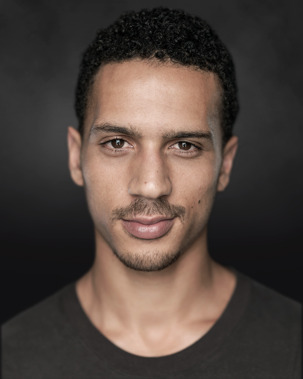
GABRIEL AKUWUDIKE
Gabriel Akuwudike is a British-Nigerian actor who has appeared in the acclaimed series Hanna (Prime Video). Other TV credits include Ridley Road (BBC) and War of the Worlds (FX/Disney+). He has appeared in films including Sam Mendes’ 1917, and HBO’s Brexit directed by Toby Haynes.
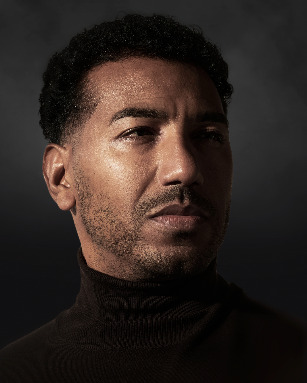
YASEN ‘ZATES’ ATOUR
Yasen ‘Zates’ Atour is most known for his role as “Coen” in Season Two of The Witcher (Netflix). He was also a series regular in Young Wallander (Netflix), playing the role of “Reza Al-Rahman.” He directed the film Good Intentions and was an executive producer and star of the film When the Screaming Starts.

BEN DANIELS
Ben Daniels has had recurring roles in television including Jupiter’s Legacy (Netflix) as “Walter Sampson,” The Crown (Netflix) as “Lord Snowdon,” The Exorcist (Hulu) as “Father Marcus Keane,” House of Cards (Netflix) as “Adam Galloway,” and Law & Order: UK (ITV) as “James Steel.” Film credits include roles in Benediction, Captive State, Rogue One: A Star Wars Story, and The Exception. Ben is an award-winning stage actor who has appeared in numerous productions including The Normal Heart (National Theatre – Olivier Award Nomination - Best Actor, Critics' Circle Theatre Award – Best Actor), All My Sons (National Theatre - Olivier Award – Best Supporting Actor), and Les Liaisons Dangereuses (Broadway - Tony and Drama Desk Nominations – Best Actor). Ben trained at the London Academy of Music and Dramatic Arts.

SAM HAZELDINE
Sam Hazeldine’s credits include Peaky Blinders (BBC), Slow Horses (Apple TV+), The Huntsman: Winter’s War, Mechanic: Resurrection, and Ridley Scott’s The Last Duel. He currently appears in The Sandman (Netflix) and The Playlist (Netflix), and will next be seen in the upcoming Band of Brothers sequel Masters of The Air (AppleTV+) opposite Austin Butler and Callum Turner, and starring alongside Jonah Hauer-King and Dar Zuzovsky in the Casanova drama feature, A Beautiful Imperfection.

AMELIA KENWORTHY
Amelia Kenworthy is a graduate of the Royal Academy of Dramatic Arts. While at RADA, she performed in numerous stage productions including Spring Awakening as “Anna,” A Midsummer Night’s Dream as “Puck,” Two Gentlemen of Verona as “Julia,” Pomona as “Ollie” and Against as “Shiela.” She has also appeared in short films IRL and Messenger. She will make her television debut in The Lord of the Rings: The Rings of Power.

NIA TOWLE
Nia Towle was most recently seen in the Netflix film Persuasion. On stage, Nia debuted Neil Gaiman’s The Ocean at the End of the Lane at both the National Theatre and Duke of York Theatre. During her studies at Guildhall School of Drama, from which she graduated in 2021, Nia played leading roles in plays including Yerma, A Streetcar Named Desire, and Medea.

NICHOLAS WOODESON
Nicholas Woodeson is a veteran English performer of television, film, and theatre. In television, his credits include Silent Witness (BBC), Baptiste (BBC), The Honourable Woman (BBC), Poirot (ITV), and Rome (HBO / BBC). He can also be seen in films including The Hustle, Paddington 2, The Danish Girl, Skyfall, and Conspiracy. His most recent theatre performances include The Two Popes, “The Duke of Norfolk” in The Mirror and The Light, “The Mayor” in The Visit, “Pope Francis” in The Pope, “Mr. Kidd” in The Room, and “Willy” in Death of a Salesman. Nicholas is a graduate of the Royal Academy of Dramatic Arts.
#the lord of the rings#the rings of power#lotr trop#Nicholas Woodeson#nia towle#Amelia Kenworthy#Sam Hazeldine#ben daniels#Yasen ‘Zates’ Atour#Gabriel Akuwudike
17 notes
·
View notes